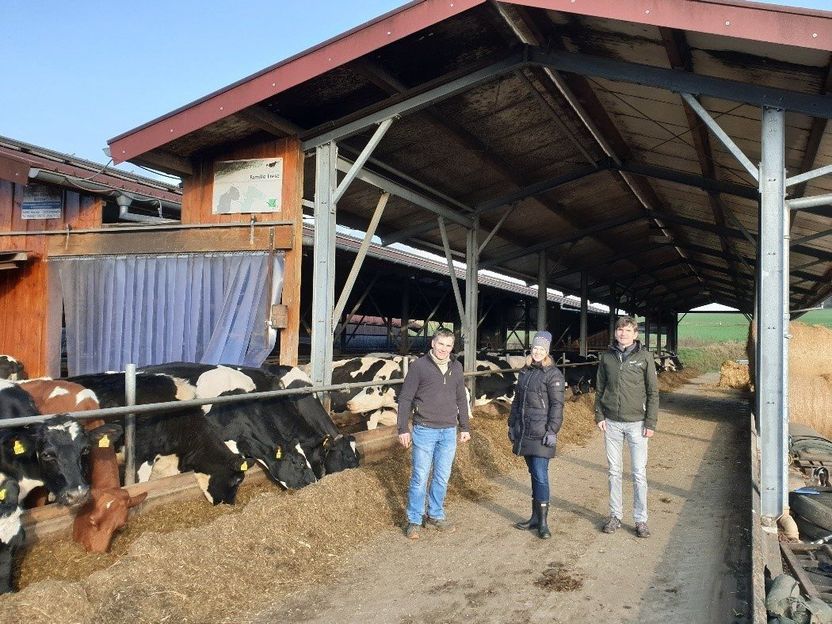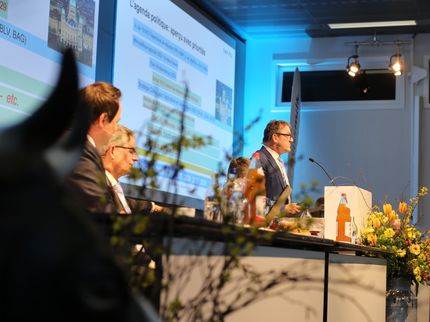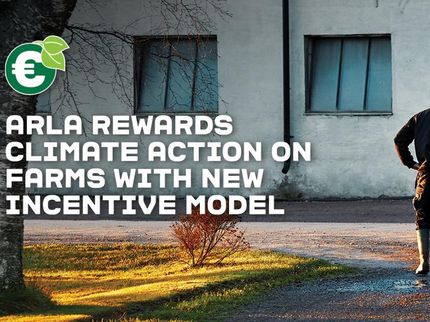Nestlé launches first "climate milk farm" in Germany
Pilot project of a low-emission dairy farm of the Hochwald Milch Genossenschaft in Hesse to become a model for other farmers
Advertisement
Lots of cows, zero greenhouse gases: Nestlé is launching its first "climate dairy farm" in Germany. The aim of the pilot project is to reduce the footprint of a farm to zero emissions. Over a period of three years, Nestlé Germany will follow a dairy farm run by its long-standing supplier Hochwald, which supplies, among other things, the mozzarella cheese for Nestlé Wagner pizzas. The Frese family's farm in northern Hesse has 135 cows and is to become a model for other farmers. The project is led by the Nürtingen-Geislingen University of Applied Sciences (HfWU), with scientific and technical advice from the project partners Thünen Institute for Business Administration and the Lake Constance Foundation.

Launching the joint project on the Frese family farm: Mario Frese, farmer, Corinna Weinmiller, Nestlé, and Markus Frank, HfWU (from left to right).
Nestlé Deutschland AG
30 measures to reduce and store greenhouse gases
At the beginning, the experts of the HfWU will calculate all emissions of the company. This will be followed step by step by around 30 defined measures to reduce greenhouse gases as much as possible. This means, for example, optimal feeding of the cows, gas-tight slurry storage, construction of a biogas plant, energy generation through photovoltaic systems and optimized herd management of the cows, which ensures an increased milk yield. In parallel, more humus is built up through regenerative management of the arable land and grassland, and hedges and trees are planted so that more greenhouse gases can be stored. In the process, the "climate dairy farm" also reduces its use of pesticides and mineral fertilizers.
The aim is to get the farm's emissions in the pilot project to net zero in the model after three to five years. Prof. Dr. rer. nat. Markus Frank, Professor of Plant Health Management at HfWU, explains: "Of course, it takes decades for hedges and trees to grow really tall and for the soil to build up enough humus. In our joint project, we are therefore modeling how much CO2 the plants and soil can really store."
Climate-friendlier milk helps Nestlé achieve green zero by 2050
"With our "Climate Dairy Farm" we are doing fundamental research and learning what levers there are for dairy farms in Germany to switch to significantly lower emissions. The results of our pilot farm, including costs, will be groundbreaking for other farmers. Ultimately, the ingredients that are supplied to us will also have a smaller footprint," explains Corinna Weinmiller, Sustainability Manager at Nestlé Germany. Nestlé has committed to halving its greenhouse gas emissions globally by 2030 and becoming a net zero company along the entire value chain by 2050. Two-thirds of Nestlé's greenhouse gases are generated in agriculture. Milk is responsible for the largest share of emissions.
Nestlé, Hochwald and farmer Mario Frese benefit equally from the project
"We can only achieve the climate targets together. That's why it's important for us to work in partnership with our suppliers in agriculture," says Corinna Weinmiller. Noura Rhemouga, Sustainability Manager at Hochwald, adds: "One kilogram of milk currently causes around 1.1 kilograms of CO2. We want to reduce this CO2 footprint of our dairy products in the coming years. To do this, we need to know exactly which measures make ecological and economic sense. Our joint pilot project with the Frese family is helping us to gain valuable insights into how we can sustainably reduce greenhouse gases." Farmer Mario Frese is convinced that his farm can become a role model for other farmers: "The project focuses on the sustainability of our farm. Our goal is to know within three years where the most emissions occur on our farm, how we can reduce them and, of course, what it will cost us. Then, with credible and scientifically sound data, we can show what modern dairy production really looks like today."
Nestlé drives projects for climate-friendlier milk around the world
The "climate milk farm" with Hochwald is one of numerous projects for more climate-friendly milk that Nestlé is initiating and supporting around the world - including net-zero pilot farms in South Africa and the USA, for example. "In South Africa, we have already had good experience with a "climate milk farm"," says Corinna Weinmiller. "Our goal must be to establish low-emission climate dairy farms on a large scale and in a sustainable manner."
Note: This article has been translated using a computer system without human intervention. LUMITOS offers these automatic translations to present a wider range of current news. Since this article has been translated with automatic translation, it is possible that it contains errors in vocabulary, syntax or grammar. The original article in German can be found here.
































































